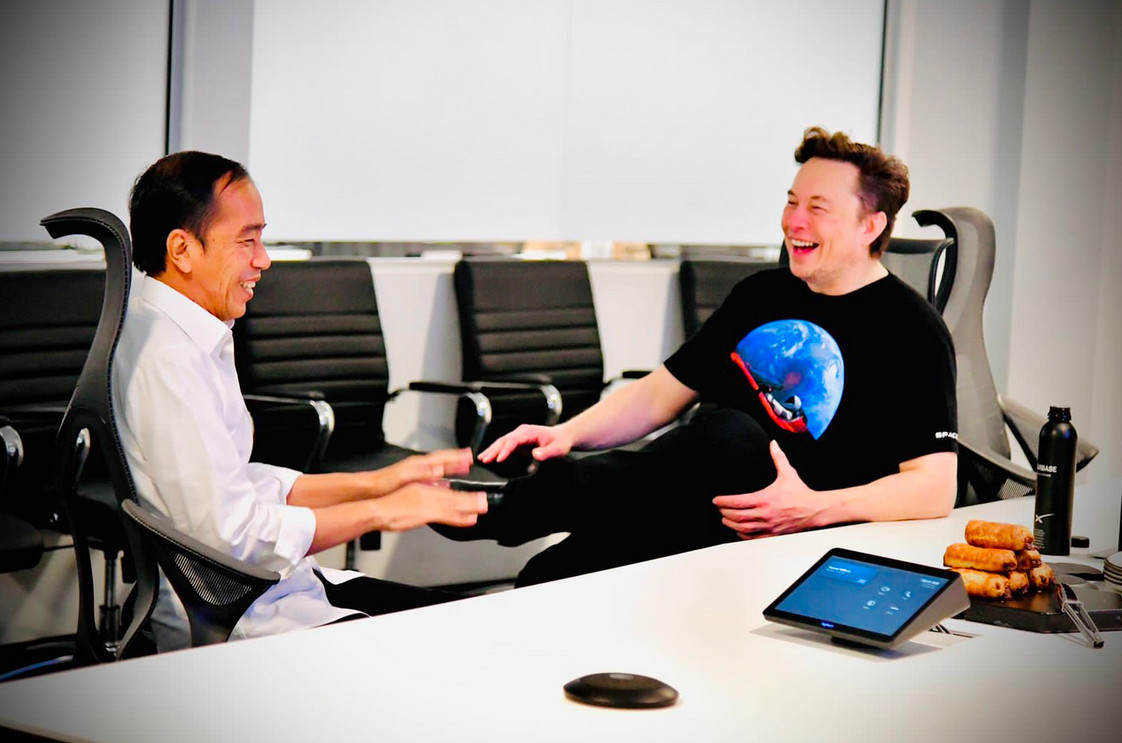Popular Reads
Top Results
Can't find what you're looking for?
View all search resultsPopular Reads
Top Results
Can't find what you're looking for?
View all search resultsIndonesia woos Tesla with green energy
The government is preparing an EV production hub in Batang, Central Java, and a ban on electricity exports.
Change text size
Gift Premium Articles
to Anyone
T
he government is promoting industrial estates supplied with electricity from renewable sources as it hopes to attract foreign direct investment by multinational firms conscious of their carbon footprint.
Coordinating Maritime Affairs and Investment Minister Luhut Pandjaitan said on Thursday that the government had proposed that Tesla build a factory in Batang regency, Central Java, with an annual capacity of roughly 500,000 electric vehicles (EV).
The government considers the location suitable because it is near geothermal power sources estimated to be able to supply 400 megawatts (MW) of generating capacity. State-owned Geo Dipa Energi runs geothermal power facilities in the region.
“We could […] channel this green energy [to Tesla’s factory],” Luhut told lawmakers during a meeting with the House of Representatives Budget Commission.
Indonesia has been increasingly protective of its new and renewable energy (EBT) sources as it is making a commitment to decarbonizing its economy, which includes making energy transition the focus of its Group of 20 leadership.
President Joko “Jokowi” Widodo and ministers have floated the idea of banning the export of electricity generated from EBT sources, arguing that should the government export the electricity, it would redirect investments to countries that would receive the electricity from Indonesia.
Read also: Indonesian ministries clash over clean power export plan
Last month, the Investment Ministry called for a ban on the export of electricity generated from EBT sources, raising questions over plans for export-focused renewable energy projects, such as the export deal of solar power from Batam, Riau Islands, to Singapore that had been signed by the Energy and Mineral Resources Ministry.
Investment Minister Bahlil Lahadalia announced the plan to ban renewable energy exports during an investment forum in Surakarta, Central Java, on May 18, where he explained that if domestic EBT electricity was exported, related industrial growth would be redirected to the importing countries.
The proposed ban was announced after Luhut and later in May President Jokowi visited the United States, where they separately met Tesla CEO Elon Musk to reiterate Indonesia’s invitation for investments.
Apart from Batang, Luhut said the carmaker had shown interest in the North Kalimantan Green Industrial Park, which has been under construction since December last year.
The industrial park is to draw power from hydropower and solar power plants to be developed near the site.
“While Thailand has just become an agent [of Tesla EV cars], we do not want the same. We want to become a producer,” Luhut said.
So far, Luhut has not been able to provide details on a possible Tesla investment, saying the government had signed a confidentiality agreement with the company.
However, the minister said talks with satellite-based internet provider Starlink – part of Musk’s SpaceX – had progressed further. He added that a deal on Starlink had been discussed with the President on Monday, while both sides were discussing technical issues in Jakarta.
Luhut also told lawmakers that Tesla had shown interest in developing the semiconductor industry in Indonesia but did not divulge details, citing a nondisclosure agreement.
Ford Motor Company is also planning to enter Indonesia’s EV industry, according to Luhut, who said representatives of the US carmaker were set to visit Indonesia on June 20 and were interested in the EV industry from upstream to downstream.
“The company wants to invest in [the EV industry] end-to-end,” Luhut said.
As the world’s largest nickel producer and the owner of rich deposits of cobalt and bauxite and copper ores, the main components in the production of electric car batteries, Indonesia has targeted to become an international hub for the EV industry.
Hyundai began manufacturing at its first electric car assembly plant in Cikarang, West Java, in March. The factory produces the carmaker’s newest EV, the IONIQ 5, with an annual capacity of 250,000 vehicles.
Jokowi said his government was aiming to establish an integrated EV "ecosystem" that would include such industry activities as metals mining, battery production and car assembly.
On Wednesday, the President inaugurated an integrated EV battery production site in Batang. The US$9.8 billion project is aimed at producing 3.5 million EV batteries annually in collaboration with state-owned nickel and gold mining firm PT Aneka Tambang (Antam) and EV battery holding company Indonesia Battery Corporation (IBC).
The inauguration followed the signing of a memorandum of understanding (MoU) between the IBC and a consortium led by LG Energy Solution on April 14.
“LG’s investment […] in Indonesia is the first investment in the world that integrates nickel mining, smelter construction, as well as precursor and cathode factories, not to mention the battery recycling industry,” Jokowi said during the ceremony.
Read also: Jokowi inaugurates first integrated EV battery project
In total, the integrated EV battery production cluster is forecast to employ about 20,000 workers. The project is comprised of four stages.
The first stage is a nickel-mining project in Halmahera, which is expected to produce 16 million tons of nickel ore annually and require an investment of $300 million. In the second phase, the nickel ore will be processed into nickel sulfates at a facility in Batang, which is estimated to cost $3.5 billion.
Meanwhile, the third stage is set to comprise the precursor and cathode production in facilities with a total investment of $2.4 billion. The fourth stage is the battery cell production, the first in Southeast Asia, with a total investment of $3.6 billion, slated to begin in April 2024.










